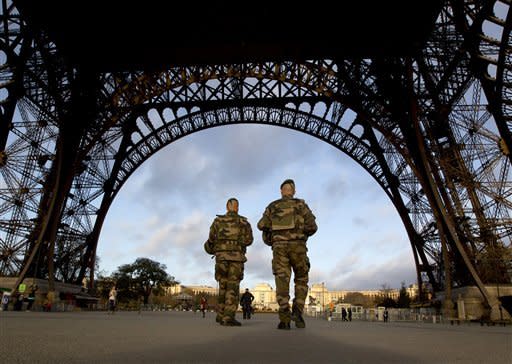Is it Safe to Travel to Paris Now?

French soldiers patrol at the Eiffel Tower, which remained closed on the first of three days of national mourning in Paris. (Peter Dejong/AP, file)
The city of Paris has been left reeling following a series of terrorist attacks.
In the wake of these devastating attacks many people are left wondering — is Paris safe?
The U.S. State Department and the U.K. Foreign Office continue to advise that further attacks are possible.
“The likelihood of further attacks is all but certain. Whilst law enforcement and security agencies around the world are working tirelessly to prevent these sorts of attacks from taking place, it would be foolish to think that they can stop all of them,” explained counterterrorism expert Mitchell McAlister, president of Salient Operations Group. “Remember those famous words written in a statement issued by the IRA after the Brighton hotel bombing, ‘…we only have to be lucky once. You will have to be lucky always.’ That is an extremely accurate assessment of the uphill battle that our intelligence agencies and law enforcement have on their hands.”
Related: Paris Air Travel Proceeds, But Some Cancel Future Visits
In response to the most recent attacks, French authorities declared a state of emergency, reestablishing border controls and implemented a curfew.
Many of the public monuments, tourist attractions, and larger retail sites were temporarily shut down, but they have since been reopened.
Travelers are still being advised to expect delays due to heightened security measures.
Local police are advising those in the city to keep movement around Paris to a minimum. Meanwhile, tightened systematic border control checks are being implemented at all entry points into the country, including road and rail crossings.
For the most recent transport updates, please visit ratp.fr
“It is very quiet out in the streets,” Yahoo Travel was told by Deborah Ernst, an American tourist currently in Paris. “There is a curfew so I imagine everyone is staying in for the night.”
Related: Travelers Share Memories and Love for Paris
Ernst, from New York, is in the city visiting her daughter, who is studying there.
"I think it is unknown what else may happen, and I think people will be very cautious,” she said.
For other U.S citizens currently in the city, there are a few things to note. The U.S. State Department released a statement urging people to “maintain a high level of vigilance, be aware of local events and take the appropriate steps to bolster their personal security, including limiting their movements to essential activity.”
Follow @TravelGov on Twitter to receive up-to-date information and real time updates on the situation. Alternatively, contact the U.S. Embassy in Paris, located at 2 Avenue Gabriel 75008 Paris, at +(33)(1) 43-12-22-22 or by email at Citizeninfo@state.gov. The after-hours emergency number for U.S. citizens is +(33)(1) 43-12-22-22.
For travelers due to head to Paris in the next couple of days but who wish to postpone, several tour companies and airlines are allowing people to delay their plans, or switch to an alternative destination for no charge.
Flights into and out of France may continue to be subject to delays due to increased security measures, so passengers are advised to arrive to the airport in plenty of time.
For further information, travel, and security updates, American travelers are advised to monitor the State Department Travel Website and France Country Specific Information.
What McAlister does note is that statistically, the chances of being harmed in a terrorist attack remain low.
“If you look at it from a statistical point of view, Paris is still a safe place to visit,” the counter terrorism expert said. “When compared to, say, road fatalities in France which usually top 3000 annually, being a victim of terrorism is still considered an extremely low likelihood.“
